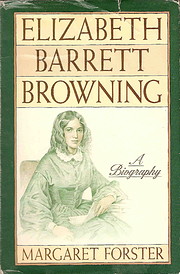

Click on a thumbnail to go to Google Books.
|
Loading... Elizabeth Barrett Browning: A Biographyby Margaret Forster
 None No current Talk conversations about this book. "This is the most exciting sort of biography to read, or to write: the myth-dispelling biography which overturns an old story, and does so most convincingly." New Statesman. I love thee with a love I seemed to lose With my lost saints-I love thee with the breath, Smiles, tears, of all my life!-and, if God choose, I shall but love thee better after death. no reviews | add a review
Awards
This biography of Elizabeth Barrett Browning, written with reference to Browning correspondence only recently available, argues that the poet was a strong and determined woman largely responsible for her own incarceration in Wimpole Street. The author traces her life from her early childhood and adolescence and explores her marriage. She draws a picture of early Victorian family life and aims to show that Elizabeth was a considerable and dedicated poet, self-willed, witty and courageous. Forster has also edited the companion volume "Selected Poems" of Elizabeth Barrett Browning, and is author of several other biographies. No library descriptions found. |
Current DiscussionsNonePopular covers
 Google Books — Loading... Google Books — Loading...GenresMelvil Decimal System (DDC)821.8Literature English & Old English literatures English poetry 1837-1899LC ClassificationRatingAverage: (4.21) (4.21)
Is this you?Become a LibraryThing Author. |
||||||||||||||||||||||||||||||||||||||||||||||||||||||||||||||||||||||||||||||||||||||||||||||||||||||||||||||||||||||||
Of course, the conciseness and avoidance of irrelevancy (as well as the reliance on letters as the main source material) also means that this comes over as a very tightly-focussed account, that seems to emphasise the claustrophobic nature of EBB's life by never zooming out much beyond the intimate confines of Hope End, Wimpole Street and Casa Guidi. We learn a lot about her health and her relations with family, intimate friends and servants that wasn't in the correspondence published in the 19th century. Unlike Virginia Woolf, Forster obviously found EBB's maid, Wilson, much more interesting than Flush the dog — hence her later historical novel Lady's Maid. What we don't get is very much about her work and how it was received, or about her wider circle of acquaintances and literary colleagues and how they saw her. I would have been interested to know a bit more about how the Brownings fitted in with the the expat community in Florence and Rome, for instance, but that's only treated very superficially. Still, there are plenty of other sources for that.
It's also a rather sober, unromantic view, which is definitely a good thing. EBB attracted a lot of romantic legends that were overdue for debunking when this book came out, and her actions and opinions were not always above criticism. Forster isn't out to do a complete hatchet job, but she does shed a bit of daylight on things like EBB's mysterious invalidity that allowed her freedom from housework and the famous Room of Ones Own to write in. The Spiritualism fad and the notorious infatuation with Napoleon III are dismissed in a couple of pages each as unimportant in the big scheme of things, but not surprisingly Forster goes into a bit more depth on the way the Brownings treated Wilson when she married and became pregnant.
So, definitely worth reading if you already know something about EBB as a poet and want to know more about the domestic detail of her life, but not so good if you want an introduction to the poetry or you're looking for perspective and analysis. (